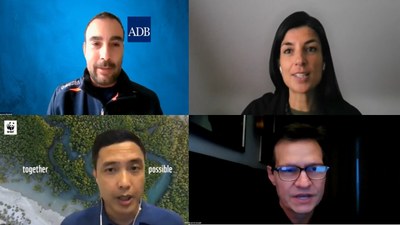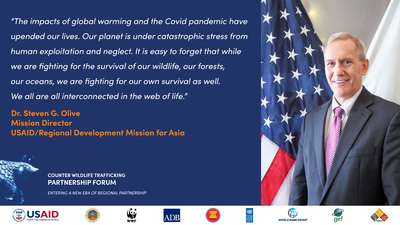International Biological Diversity Day: USAID and Partners Take CWT Partnership to the Next Level
A jointly compiled report by USAID, the World Bank, the Asian Development Bank (ADB), and the World Wildlife Fund (WWF) found that over 92 percent of partner and national representatives surveyed in the region expressed the need for a regional development partner coordination platform in Asia. In response, on April 21, USAID Reducing Demand for Wildlife, together with partners, co-hosted a virtual meeting to present the report and determine the feasibility of and next steps toward formally establishing a partner platform to combat the illegal wildlife trade in Asia.
The proposal for a CWT Development Partners Coordination Platform for Asia--to more effectively collaborate and align planned counter wildlife trafficking investments in the region for greater impact--was one of the results of the virtual Counter Wildlife Trafficking (CWT) Partnership Forum from September 21-23, 2021, co-hosted by the United States, and Thailand’s Department of National Parks, Wildlife and Plant Conservation (DNP). A wide range of partners—including donors, international and regional bodies, and government and conservation organizations—participated in the forum. The forum participants also underscored the importance of the One Health collaborative approach towards preventing pandemics as well as recovering from the current pandemic.
“I have been working in CWT the past 15 years, and the need for greater coordination is something that keeps resurfacing, as the number of organizations working in this area has multiplied in recent years. The survey results help provide a much clearer picture of the needs, challenges and issues related to coordination mechanisms, and brings us that much closer to figuring out solutions,” said Sulma Warne, Senior Technical Adviser of USAID Reducing Demand for Wildlife.
In addition to the strong consensus for a CWT platform, the majority of survey respondents rated the value of the platform as either “high” or “very high”. Without effective coordination, according to the respondents, partners tend to be unaware of other CWT projects being implemented or in the pipeline. Further, they tend to reinvent the wheel as they do not learn from each other’s experiences.
 USAID, together with the World Bank, ADB, and WWF have committed to lead the charge towards sustaining the momentum and implementing the proposed next steps, such as updating the contacts’ list, upgrading the illegal wildlife trade website, conducting a CWT investment analysis, convening further knowledge sharing exchanges for regional partners’ groups in Asia, among others.
USAID, together with the World Bank, ADB, and WWF have committed to lead the charge towards sustaining the momentum and implementing the proposed next steps, such as updating the contacts’ list, upgrading the illegal wildlife trade website, conducting a CWT investment analysis, convening further knowledge sharing exchanges for regional partners’ groups in Asia, among others.
Brad Arsenault, Regional Ecosystems Team Leader of USAID Regional Development Mission in Asia, reiterated during the forum that “the United States Government will stay robustly engaged in counter wildlife trafficking and biodiversity conservation”.
USAID is considered one of the pioneers in the counter wildlife trafficking movement, as it has been supporting the region in tackling the illegal wildlife trade since 2006 through the establishment of the ASEAN-Wildlife Enforcement Network.


